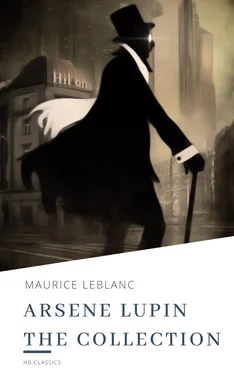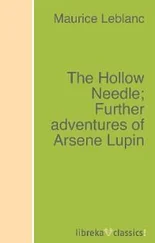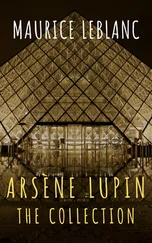But, after a fortnight's useless searching, his enthusiasm ended by slackening and he very soon lost confidence. Because success was slow in appearing, from one day to the next, almost, he ceased to believe in it; and, though he continued to pursue his plan of investigations, he would have felt a real surprise if his efforts had led to the smallest discovery.
More days still passed by, monotonous days of discouragement. He read in the newspapers that the Comte de Gesvres and his daughter had left Ambrumesy and gone to stay near Nice. He also learnt that Harlington had been released, that gentleman's innocence having become self-obvious, in accordance with the indications supplied by Arsene Lupin.
Isidore changed his head-quarters, established himself for two days at the Chatre, for two days at Argenton. The result was the same.
Just then, he was nearly throwing up the game. Evidently, the gig in which his father had been carried off could only have furnished a stage, which had been followed by another stage, furnished by some other conveyance. And his father was far away.
He was thinking of leaving, when, one Monday morning, he saw, on the envelope of an unstamped letter, sent on to him from Paris, a handwriting that set him trembling with emotion. So great was his excitement that, for some minutes, he dared not open the letter, for fear of a disappointment. His hand shook. Was it possible? Was this not a trap laid for him by his infernal enemy?
He tore open the envelope. It was indeed a letter from his father, written by his father himself. The handwriting presented all the peculiarities, all the oddities of the hand which he knew so well.
He read:
Will these lines ever reach you, my dear son? I dare not believe it.
During the whole night of my abduction, we traveled by motor car; then, in the morning, by carriage. I could see nothing. My eyes were bandaged. The castle in which I am confined should be somewhere in the midlands, to judge by its construction and the vegetation in the park. The room which I occupy is on the second floor: it is a room with two windows, one of which is almost blocked by a screen of climbing glycines. In the afternoon, I am allowed to walk about the park, at certain hours, but I am kept under unrelaxing observation.
I am writing this letter, on the mere chance of its reaching you, and fastening it to a stone. Perhaps, one day, I shall be able to throw it over the wall and some peasant will pick it up.
But do not be distressed about me. I am treated with every consideration.
Your old father, who is very fond of you and very sad to think of the trouble he is giving you,
BEAUTRELET.
Isidore at once looked at the postmarks. They read, "Cuzion, Indre."
The Indre! The department which he had been stubbornly searching for weeks!
He consulted a little pocket-guide which he always carried. Cuzion, in the canton of Eguzon—he had been there too.
For prudence's sake, he discarded his personality as an Englishman, which was becoming too well known in the district, disguised himself as a workman and made for Cuzion. It was an unimportant village. He would easily discover the sender of the letter.
For that matter, chance served him without delay:
"A letter posted on Wednesday last?" exclaimed the mayor, a respectable tradesman in whom he confided and who placed himself at his disposal. "Listen, I think I can give you a valuable clue: on Saturday morning, Gaffer Charel, an old knife-grinder who visits all the fairs in the department, met me at the end of the village and asked, 'Monsieur le maire, does a letter without a stamp on it go all the same?' 'Of course,' said I. 'And does it get there?' 'Certainly. Only there's double postage to pay on it, that's all the difference.'
"And where does he live?"
"He lives over there, all alone—on the slope—the hovel that comes next after the churchyard.—Shall I go with you?"
It was a hovel standing by itself, in the middle of an orchard surrounded by tall trees. As they entered the orchard, three magpies flew away with a great splutter and they saw that the birds were flying out of the very hole in which the watch-dog was fastened. And the dog neither barked nor stirred as they approached.
Beautrelet went up in great surprise. The brute was lying on its side, with stiff paws, dead.
They ran quickly to the cottage. The door stood open. They entered. At the back of a low, damp room, on a wretched straw mattress, flung on the floor itself, lay a man fully dressed.
"Gaffer Charel!" cried the mayor. "Is he dead, too?"
The old man's hands were cold, his face terribly pale, but his heart was still beating, with a faint, slow throb, and he seemed not to be wounded in any way.
They tried to resuscitate him and, as they failed in their efforts, Beautrelet went to fetch a doctor. The doctor succeeded no better than they had done. The old man did not seem to be suffering. He looked as if he were just asleep, but with an artificial slumber, as though he had been put to sleep by hypnotism or with the aid of a narcotic.
In the middle of the night that followed, however, Isidore, who was watching by his side, observed that the breathing became stronger and that his whole being appeared to be throwing off the invisible bonds that paralyzed it.
At daybreak, he woke up and resumed his normal functions: ate, drank and moved about. But, the whole day long, he was unable to reply to the young man's questions and his brain seemed as though still numbed by an inexplicable torpor.
The next day, he asked Beautrelet:
"What are you doing here, eh?"
It was the first time that he had shown surprise at the presence of a stranger beside him.
Gradually, in this way, he recovered all his faculties. He talked. He made plans. But, when Beautrelet asked him about the events immediately preceding his sleep, he seemed not to understand.
And Beautrelet felt that he really did not understand. He had lost the recollection of all that had happened since the Friday before. It was like a sudden gap in the ordinary flow of his life. He described his morning and afternoon on the Friday, the purchases he had made at the fair, the meals he had taken at the inn. Then— nothing—nothing more. He believed himself to be waking on the morrow of that day.
It was horrible for Beautrelet. The truth lay there, in those eyes which had seen the walls of the park behind which his father was waiting for him, in those hands which had picked up the letter, in that muddled brain which had recorded the whereabouts of that scene, the setting, the little corner of the world in which the play had been enacted. And from those hands, from that brain he was unable to extract the faintest echo of the truth so near at hand!
Oh, that impalpable and formidable obstacle, against which all his efforts hurled themselves in vain, that obstacle built up of silence and oblivion! How clearly it bore the mark of Arsene Lupin! He alone, informed, no doubt, that M. Beautrelet had attempted to give a signal, he alone could have struck with partial death the one man whose evidence could injure him. It was not that Beautrelet felt himself to be discovered or thought that Lupin, hearing of his stealthy attack and knowing that a letter had reached him, was defending himself against him personally. But what an amount of foresight and real intelligence it displayed to suppress any possible accusation on the part of that chance wayfarer! Nobody now knew that within the walls of a park there lay a prisoner asking for help.
Nobody? Yes, Beautrelet. Gaffer Charel was unable to speak. Very well. But, at least, one could find out which fair the old man had visited and which was the logical road that he had taken to return by. And, along this road, perhaps it would at last be possible to find—
Читать дальше












